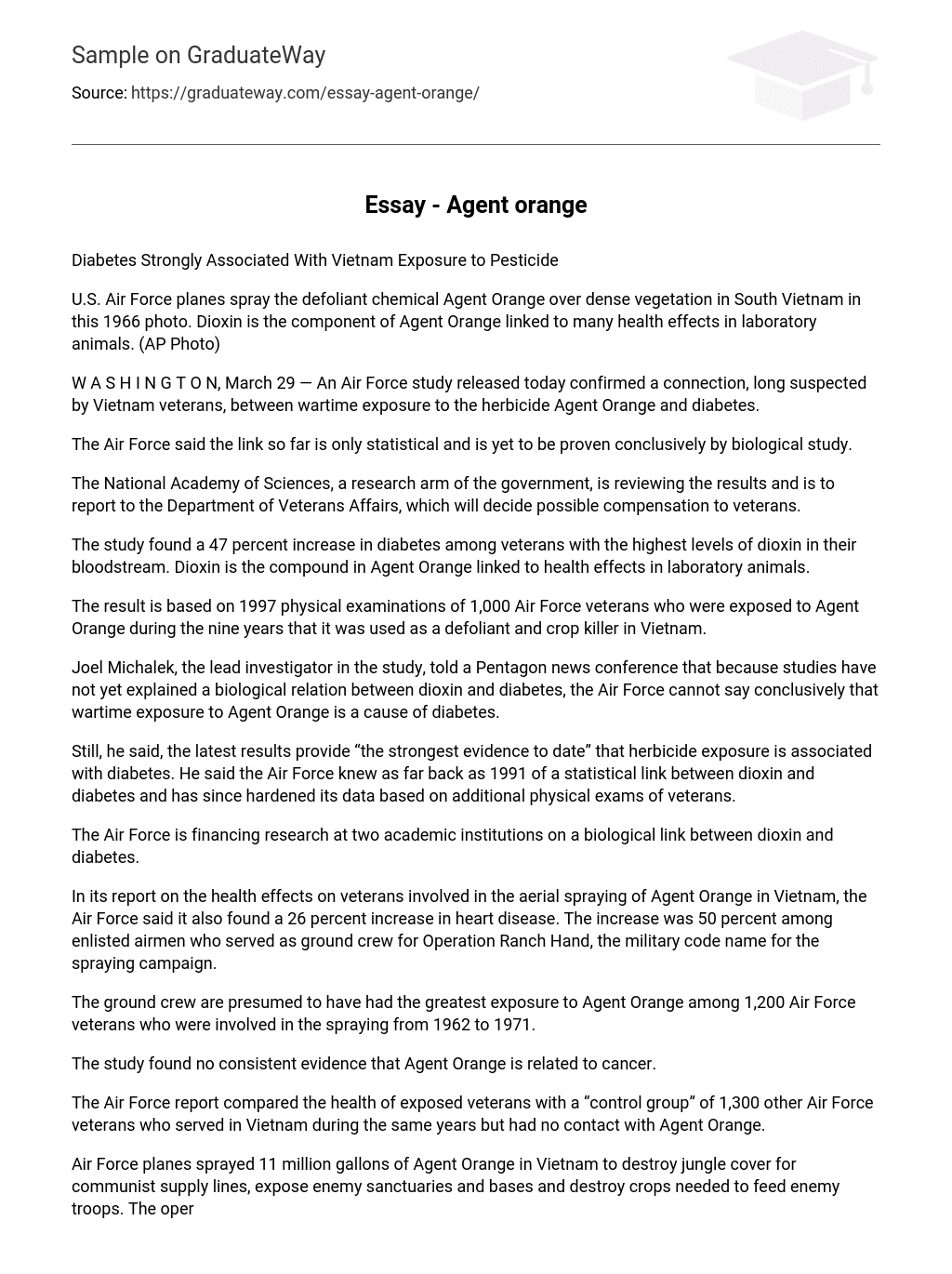Exposure to a pesticide during the Vietnam War is strongly associated with the development of diabetes.
The photograph depicts the application of Agent Orange, a chemical defoliant, by U.S. Air Force planes in 1966 for the purpose of spraying dense vegetation in South Vietnam. This particular operation entailed the use of Agent Orange, which is acknowledged to contain dioxin. Scientific experiments have established a correlation between dioxin and numerous health problems in animals. (AP Photo)
According to a study conducted by the Air Force in Washington on March 29, it has been confirmed that veterans’ belief regarding the link between exposure to Agent Orange during the Vietnam War and diabetes is valid.
According to the Air Force, the current correlation has not been definitively established through biological research and is solely based on statistics.
The National Academy of Sciences, a government research arm, will provide its findings to the Department of Veterans Affairs, which will subsequently determine potential compensation for veterans.
According to a recent study, veterans who have high levels of dioxin in their blood experienced a notable 47 percent rise in diabetes. This harmful substance is present in Agent Orange and has been linked to negative health effects observed in animals during laboratory experiments.
The information comes from a study conducted in 1997 on 1,000 Air Force veterans who were exposed to Agent Orange for nine years during the Vietnam War. Agent Orange was used as a defoliant and crop destroyer.
According to Joel Michalek, the lead investigator in the study, there is currently no established biological connection between dioxin and diabetes. As a result, the Air Force cannot definitively affirm that exposure to Agent Orange during wartime directly causes diabetes.
According to the speaker, the recent results are considered the strongest evidence yet for a link between diabetes and exposure to herbicides. The Air Force was already aware of a statistical correlation between dioxin and diabetes back in 1991, as mentioned by the speaker. In order to strengthen this evidence, additional physical examinations of veterans have been conducted.
The Air Force is funding research on the potential relationship between dioxin and diabetes at two academic institutions.
According to an Air Force report, veterans who were involved in aerial spraying of Agent Orange in Vietnam saw a 26% increase in heart disease. In contrast, enlisted airmen serving as ground crew for Operation Ranch Hand, the military’s codename for the campaign, had an even higher rise of 50%.
From 1962 to 1971, a ground crew of 1,200 Air Force veterans participated in the spraying operations and is considered to have had the most significant exposure to Agent Orange.
There is no consistent evidence that reliably connects cancer to Agent Orange.
The Air Force report compared the health conditions of veterans who were exposed to Agent Orange with a control group consisting of 1,300 other Air Force veterans who served in Vietnam during the same time period but had no exposure to Agent Orange.
During the Vietnam War, the Air Force utilized 11 million gallons of Agent Orange to eliminate jungle cover, uncover enemy sanctuaries and bases, and eradicate crops essential for feeding enemy troops. This military operation drew comparisons to chemical warfare from certain critics during that period.
Airmen were exposed to Agent Orange during their spraying flights, loading process, and aircraft maintenance. This herbicide was named after the orange-striped barrels used for transportation. It was one of many defoliants used in the war.
Rep. Bernard Sanders, I-Vt., a member of the House Government Reform Committee overseeing veterans affairs, confirms that the Air Force findings provide evidence for the suspected connection between diabetes and veterans over a significant period of time.
On Wednesday, Sanders emphasized that it is crucial for the federal government to acknowledge and offer appropriate compensation to Vietnam veterans who are facing difficulties because of diabetes.
Sanders also called for the United States to send researchers to Vietnam after Vietnam recently reported that 1 million of its citizens have been impacted by Agent Orange.
The study was initiated in 1981, with Air Force veterans who were exposed to certain conditions undergoing initial physical examinations one year later. The research is set to be completed by 2006.
The Vietnam Veterans of America and other organizations have criticized the small size of the study and the Air Force’s handling of its findings. They argue that the handling is excessively secretive and delayed in sharing with other researchers.





